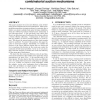Free Online Productivity Tools
i2Speak
i2Symbol
i2OCR
iTex2Img
iWeb2Print
iWeb2Shot
i2Type
iPdf2Split
iPdf2Merge
i2Bopomofo
i2Arabic
i2Style
i2Image
i2PDF
iLatex2Rtf
Sci2ools
ATAL
2010
Springer
2010
Springer
Worst-case efficiency ratio in false-name-proof combinatorial auction mechanisms
This paper analyzes the worst-case efficiency ratio of falsename-proof combinatorial auction mechanisms. False-nameproofness generalizes strategy-proofness by assuming that a bidder can submit multiple bids under fictitious identifiers. Even the well-known Vickrey-Clarke-Groves mechanism is not false-name-proof. It has previously been shown that there is no false-name-proof mechanism that always achieves a Pareto efficient allocation. Consequently, if false-name bids are possible, we need to sacrifice efficiency to some extent. This leaves the natural question of how much surplus must be sacrificed. To answer this question, this paper focuses on worst-case analysis. Specifically, we consider the fraction of the Pareto efficient surplus that we obtain and try to maximize this fraction in the worst-case, under the constraint of false-name-proofness. As far as we are aware, this is the first attempt to examine the worst-case efficiency of false-name-proof mechanisms. We show that the wor...
ATAL 2010 | Combinatorial Auction Mechanisms | False-name-proof Mechanisms | Intelligent Agents | Worst-case Efficiency Ratio |
| Added | 08 Nov 2010 |
| Updated | 08 Nov 2010 |
| Type | Conference |
| Year | 2010 |
| Where | ATAL |
| Authors | Atsushi Iwasaki, Vincent Conitzer, Yoshifusa Omori, Yuko Sakurai, Taiki Todo, Mingyu Guo, Makoto Yokoo |
Comments (0)

